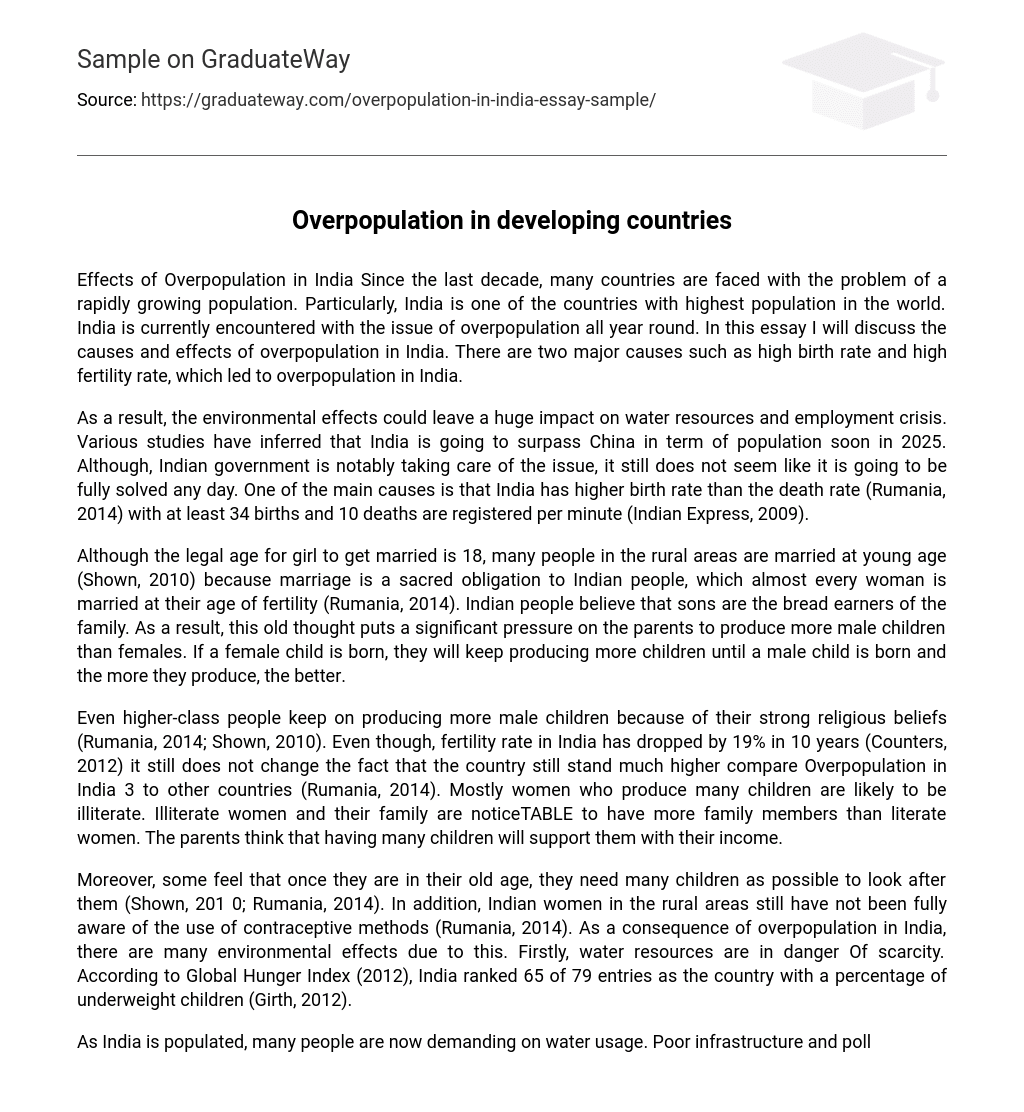Effects of Overpopulation in India Since the last decade, many countries are faced with the problem of a rapidly growing population. Particularly, India is one of the countries with highest population in the world. India is currently encountered with the issue of overpopulation all year round. In this essay I will discuss the causes and effects of overpopulation in India. There are two major causes such as high birth rate and high fertility rate, which led to overpopulation in India.
As a result, the environmental effects could leave a huge impact on water resources and employment crisis. Various studies have inferred that India is going to surpass China in term of population soon in 2025. Although, Indian government is notably taking care of the issue, it still does not seem like it is going to be fully solved any day. One of the main causes is that India has higher birth rate than the death rate (Rumania, 2014) with at least 34 births and 10 deaths are registered per minute (Indian Express, 2009).
Although the legal age for girl to get married is 18, many people in the rural areas are married at young age (Shown, 2010) because marriage is a sacred obligation to Indian people, which almost every woman is married at their age of fertility (Rumania, 2014). Indian people believe that sons are the bread earners of the family. As a result, this old thought puts a significant pressure on the parents to produce more male children than females. If a female child is born, they will keep producing more children until a male child is born and the more they produce, the better.
Even higher-class people keep on producing more male children because of their strong religious beliefs (Rumania, 2014; Shown, 2010). Even though, fertility rate in India has dropped by 19% in 10 years (Counters, 2012) it still does not change the fact that the country still stand much higher compare Overpopulation in India 3 to other countries (Rumania, 2014). Mostly women who produce many children are likely to be illiterate. Illiterate women and their family are noticeTABLE to have more family members than literate women. The parents think that having many children will support them with their income.
Moreover, some feel that once they are in their old age, they need many children as possible to look after them (Shown, 201 0; Rumania, 2014). In addition, Indian women in the rural areas still have not been fully aware of the use of contraceptive methods (Rumania, 2014). As a consequence of overpopulation in India, there are many environmental effects due to this. Firstly, water resources are in danger Of scarcity. According to Global Hunger Index (2012), India ranked 65 of 79 entries as the country with a percentage of underweight children (Girth, 2012).
As India is populated, many people are now demanding on water usage. Poor infrastructure and pollution led to a decline of water quantity and quality in India (Standards, 2012). It might seem like the availTABLE water is the same as it was but increasing population and demand on fresh water has risen. “If something is not done soon, an estimated 1 14 million Indian will soon face desperate domestic, agricultural and industrial shortage” (Ram, 2014, The Pulse). Finding a job in a country such as India is not easy.
There are many jobless people in the country because of the country’s current state. Unemployment rate is an increasing trend in India (Rumania, 2014). Due to migration to urban areas, people from the rural areas are now finding job to fit their qualities. However, group of Indian youths in the age of 18-25 despite being skilled, are struggling to find job because there are not enough opportunities for such a huge of amount of people and they are left with no job (PIT, 2014). India 4 Overpopulation in In this essay, we have discussed about the causes and effects of overpopulation in India.
The causes are high rate of birth and high rate of fertility, the effects are scarce water resources and the issue of unemployment. To sum up, India is still confronted with the problem of overpopulation and it will always be crowded if their education system is not upgraded. If one country is developed, their people must be developed first. Initially, they must have few children so in the future the parents would have more ability to take care of their own children. I strongly believe if the country s doing this, poverty and illiteracy will be reduced to stabile levels.





